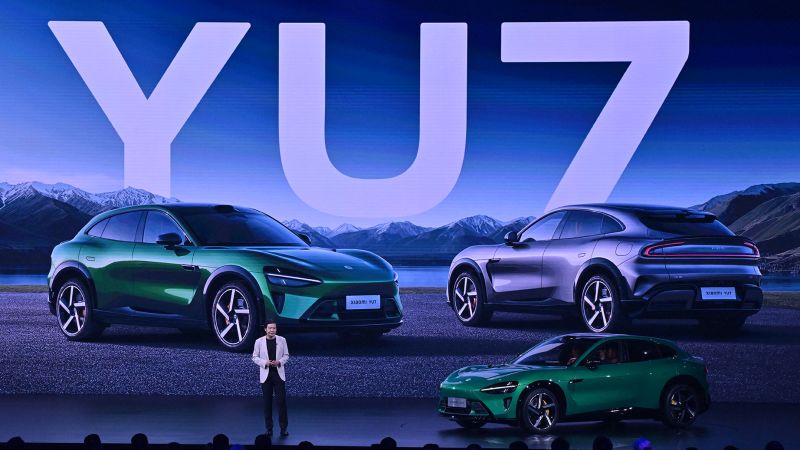In a significant move aimed at expanding its offerings beyond budget devices, the Chinese consumer electronics leader, Xiaomi, has officially launched its first electric SUV and unveiled a self-designed mobile chip. This announcement marks a pivotal moment for the company, emphasizing its ambition to diversify its portfolio and bolster its technological prowess in a highly competitive landscape. The launch, which took place during a livestreamed event in Beijing, was introduced by Xiaomi’s CEO and founder, Lei Jun.
During this event, the spotlight was on two primary products: the YU7 SUV and the advanced Xring O1 chip. The YU7 represents Xiaomi’s inaugural foray into the SUV market, designed to offer consumers a mileage range of up to 835 kilometers (518 miles) on a single charge. The high-performance model is expected to accelerate from zero to 100 kilometers per hour (62 mph) in slightly over three seconds, a figure that Lei claims exceeds the performance metrics of rivals including Tesla’s Model Y and comparable offerings from Porsche. Additionally, the standard variants will come equipped with sophisticated driving assistance technologies. However, details regarding pricing and the pre-order timeline remain undisclosed, as Lei has indicated that Xiaomi will hold off on these announcements for now.
This unveiling is a part of Xiaomi’s celebration of its 15th anniversary, but it is also a strategic response following a tragic incident earlier this year involving one of their electric vehicles, which raised questions about the safety of their self-driving technology and led to a temporary decline in vehicle orders. As they expand into automobiles and chip manufacturing, Xiaomi’s strategy aligns with the broader objectives of the Chinese government to reduce dependency on foreign technology and increase home-grown innovation.
The introduction of the Xring O1 chip is particularly noteworthy. Developed over several years, Xiaomi invested around 13.5 billion yuan (approximately $1.87 billion) into the creation of this new chip, which boasts a 3-nanometer production process designed to rival existing chips from tech giants like Apple and Qualcomm. Lei emphasized that this chip has outperformed Apple’s A18 Pro in critical evaluations, particularly in terms of thermal management during intensive usage such as gaming. The Xring O1 will make its debut in Xiaomi’s latest smartphone, the 15S Pro, which is priced at approximately 5,499 yuan ($764).
In comparing their accomplishments with other Chinese tech competitors, Xiaomi’s advancement in chip design positions it ahead of Huawei, which has struggled to produce chips smaller than seven nanometers due to American trade restrictions. Unlike Huawei, which has been cut off from collaborating with major semiconductor manufacturers, Xiaomi aims to establish a more independent supply chain by issuing its own chips. This not only reduces reliance on companies like Qualcomm and MediaTek for their mobile devices but also places Xiaomi in a similar strategic position to Apple, which maintains a vertically integrated model for its hardware and software.
Furthermore, Xiaomi’s dedication to semiconductor development reflects a long-term vision demonstrated by Lei in a recent social media announcement. He revealed that the company began focusing on this area over a decade ago, outlining plans for sustained investment, committing at least 50 billion yuan ($7 billion) over the next ten years. As competition intensifies in the global tech landscape, particularly amidst US-China tensions over semiconductor access, Xiaomi hopes to leverage its technological innovations to carve out a prominent position.
Such commentary from Chinese state media, including notable mentions in People’s Daily, highlights Xiaomi’s developments as emblematic of private sector resilience and innovation amid challenging circumstances. The narrative suggests that Xiaomi’s trajectory in advancing both electric vehicle technology and domestic semiconductors illustrates the capacity for private enterprises to “blaze new trails” within the evolving international landscape.
As tensions between the US and China continue to impede the semiconductor industry, the actions taken by Xiaomi could serve as a crucial test case for the ability of Chinese companies to lead in an arena heavily influenced by geopolitical dynamics. With their dual commitment to electric vehicles and self-produced chips, Xiaomi is setting out to solidify its presence and assert its capabilities in a fast-paced, ever-evolving technological world.



